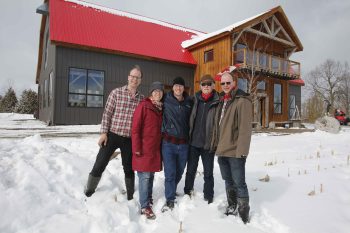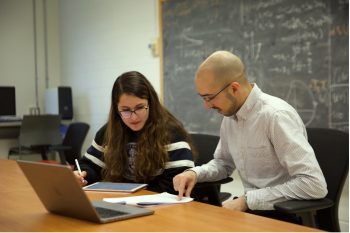The University of Toronto’s Human-Powered Vehicle Team placed third overall at the 2011 World Human-Powered Speed Challenge, held in Battle Mountain, Nevada.
The competition took place from September 12 to 17 on a flat and almost perfectly straight eight-kilometre stretch of highway in the Nevada desert.
The U of T team had a top speed of 117 km/h, which was a personal best for racer and PhD candidate Todd Reichert, who spent the last year cycling and speed skating, working with the Peak Centre for Human Performance, in Ottawa. He now boasts the title of ninth fastest human of all time.
He was joined on the road by fellow U of T racers Victor Ragusila, Trefor Evans and Aidan Muller, who all reached speeds in excess of 97km/h throughout the week.
The bike, named Vortex, was constructed by a team that included both undergraduate and graduate engineering students. The primary team members include Ragusila, Evans, Muller and Reichert, in addition to Marissa Goldsmith, Keith Hui, Alfie Tham, Rosemary Chiu and Vladislav Ternovsky.
The project gives students a chance to get hands on experience in engineering design as well as exposing them to leading-edge construction methods with carbon fibre and other space-age materials. To design a vehicle that can reach 117 km/hr on less than one horsepower requires a novel design approach.
“With a car, you can always get it to go faster by putting in a bigger engine,” says Reichert. “The starting point for a human-powered vehicle is one of limited resources in the form of a one horsepower engine. If you want to go faster, you have to be smarter. It’s a design philosophy that’s very important for today’s engineers.”
In addition to being designed for top speed, the bike is capable of carrying groceries, navigating tight turns and going over speed bumps. It was originally designed to race in the “Utility” class of the American Society of Mechanical Engineers Human-Powered Vehicle Challenge. The team scored first place out of a field of more than 30 universities in the 2011 Challenge.
The team has already started work on next year’s design, which they believe will be able to break the current land-speed record of 133.3 km/hr.
Read about the team’s success in the Toronto Star .
The U of T Human-Powered Vehicle Team is not the only group of engineers surpassing personal bests. See what the Blue Sky Solar Racing Team has built here.



